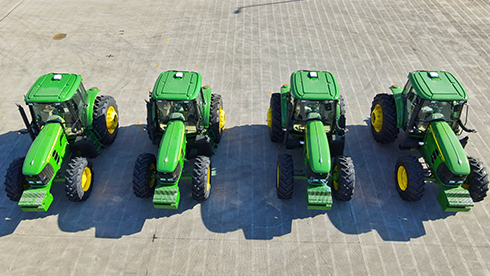Efficient irrigation management is crucial for sustainable agriculture and optimizing resource use. As the global agricultural landscape faces challenges related to water scarcity and climate change, incorporating advanced irrigation management systems becomes increasingly essential. This article explores the technologies and equipment used in these systems, particularly focusing on precision farming equipment that enables farmers to improve their irrigation practices.
Understanding Smart Irrigation Controllers
Smart irrigation controllers represent a significant advancement in precision farming equipment aimed at optimizing irrigation efficiency. These devices utilize real-time data to adjust watering schedules based on weather conditions, soil moisture levels, and crop needs. By leveraging sensors, smart controllers can determine when and how much water to apply, ensuring that crops receive the exact amount of irrigation required for optimal growth.
One of the key benefits of smart irrigation controllers is their ability to reduce water waste. Traditional irrigation systems often operate on fixed schedules, which may not align with the actual needs of the crops or changing environmental conditions. In contrast, smart controllers can react promptly to rainfall events or shifting temperature patterns, minimizing overwatering and promoting water conservation.
The Role of Drip Irrigation Systems
Drip irrigation systems are another vital component of modern irrigation management, exemplifying the application of precision farming equipment. This technology delivers water directly to the plant’s root zone through a network of tubing and emitters, reducing evaporation and runoff. By targeting specific areas for watering, drip systems enhance the efficiency of water usage compared to conventional methods.
The implementation of drip irrigation offers several advantages for farmers. It promotes uniform water distribution, minimizes weed growth, and improves soil health by preventing waterlogging. Moreover, drip systems can be combined with fertigation techniques, allowing farmers to deliver nutrients alongside water, optimizing crop yields while further conserving resources.
Integrating Soil Moisture Sensors
To enhance irrigation management, soil moisture sensors have become increasingly popular within precision farming equipment. These sensors provide real-time feedback on soil moisture levels, enabling farmers to make informed decisions regarding irrigation timing and quantity. By integrating this data into their irrigation management systems, farmers can optimize water usage and improve crop performance.
Soil moisture sensors help reduce labor and operational costs by automating irrigation processes. When soil moisture reaches a predetermined threshold, the system can activate irrigation, ensuring that crops are watered only when necessary. This level of automation not only conserves water but also enhances field management by freeing up valuable time for farmers.
Conclusion
In conclusion, effective irrigation management systems play a pivotal role in optimizing agricultural practices, particularly through the use of precision farming equipment. By incorporating smart irrigation controllers, drip irrigation systems, and soil moisture sensors, farmers can significantly enhance their irrigation efficiency and contribute to sustainable agricultural practices. At CHCNAV Agriculture, we are committed to providing innovative precision farming solutions, including our CHCNAV Agriculture NX510 Pro, which supports various applications such as precision seeding, tillage operations, fertilizer application, and harvesting optimization. Embracing these advanced technologies empowers farmers to cultivate crops more efficiently, ultimately leading to better yields and resource management.

